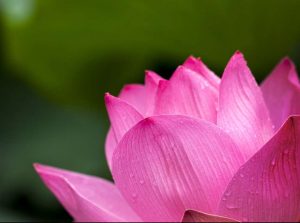
The origins of Dharmakara, the former body of Amitabha Buddha
In order to understand the essence of Amitabha’s 48 vows, especially the Fundamental Vow, we must know what prompted and motivated Dharmakara, the former body of Amitabha Buddha, to make his vows to become a buddha in the causal ground.
The Infinite Life Sutra spoken by Shakyamuni Buddha says: “In the distant past, a tathagata named Dipankara appeared in the world. Having taught and liberated innumerable beings and led them to the path of Enlightenment, he entered Nirvana.” After him came 52 tathagatas who successively entered Nirvana. Then Buddha Lokeshvararaja appeared in the world.
At that time there was a king, who, having heard Lokeshvararaja’s exposition of the Dharma, rejoiced in his heart and awakened an aspiration for the highest, perfect Enlightenment. He renounced his kingdom and his throne and became a sramana monk, taking the name of Dharmakara.
Having superior intelligence, courage, and wisdom, Bhikshu Dharmakara distinguished himself as a seeker of the Dharma. He went to see Lokeshvararaja Tathagata and reverently praised him. He resolved to become a buddha who was different from all other buddhas, as his vows would be so great that they would surpass those made by all previous buddhas.
The basic intent of Dharmakara of delivering ordinary beings who are subject to birth and death
Bhikshu Dharmakara says in verse:
I resolve to become a Buddha,
Equal in attainment to you, O holy king of the Dharma,
To save living beings from birth-and-death,
And to lead them all to emancipation.
I vow that, when I have become a Buddha,
I shall carry out this promise everywhere;
And to all fear-ridden beings
Shall I give great peace.
In this verse, it can be noted that Dharmakara’s target for deliverance is all living beings who suffer from the cycle of birth and death: that is, ordinary beings like us in the Land of Saha. He vows to get relieve us of all our fears, particularly the fear of death, and to give us the great peace which is the ultimate emancipation. This is Nirvana, a state of no-birth and no-death.
In this respect, the original intent of Amitabha Buddha by becoming a buddha is to save, protect, and deliver all sentient beings by his power, not to preach the Buddhist teachings and strengthen the cultivation of sentient beings by their own power. He fixes his mind on ordinary beings who reincarnate within the Six Realms, rather than on sacred beings who are capable of practicing the meditative and non-meditative virtues with the Bodhi mind.
Dharmakara’s intention is to build a land where all sentient beings of the ten directions can dwell in peace and joy
The verse continues:
When I have become a Buddha,
My land shall be most exquisite,
And its people wonderful and unexcelled;
The seat of Enlightenment shall be supreme.
My land, being like Nirvana itself,
Shall be beyond comparison.
I take pity on living beings
And resolve to save them all.
Those who come from the ten quarters
Shall find joy and serenity of heart;
When they reach my land,
They shall dwell in peace and joy.
I beg you, the Buddha, to become my witness
And to vouch for the truth of my aspiration.
Having now made my vows to you,
I will strive to fulfill them.
In this verse, Bhikshu Dharmakara states his intention to build the most exquisite land, which is the best of the best among all buddha-lands. The land is a realm of Nirvana, allowing all living beings to come and dwell there in peace and joy. Dharmakara also asks Lokeshvararaja Tathagata to be his witness as he sets out to build this unique buddha-land through the vast stores of merit he intends to accumulate in practicing the Dharma.
We should know that the reward of attaining rebirth in Amitabha’s Land of Bliss is the ultimate emancipation of Nirvana, not just liberation from reincarnation within the Six Realms. Through rebirth in the Land of Bliss, all become buddha-like beings with the qualities of a buddha: wisdom, supernormal powers, great compassion, infinite lifespan, and so on.
To become a buddha to deliver all sentient beings to become buddhas-to-be by rebirth is his buddha-land
The World-Honored Ones in the ten quarters
Have unimpeded wisdom;
I call upon those Honored Ones
To bear witness to my intention.
Even though I must remain
In a state of extreme pain,
I will diligently practice,
Enduring all hardships with tireless vigor.
As told in the Infinite Life Sutra, Lokeshvararaja recognized Dharmakara’s noble aspirations, and explained in detail the greater and lesser aspects of 21 billion buddha-lands, together with the good and evil natures of the heavenly and human beings who dwell in them.
Having seen all these buddha-lands in detail, Bhikshu Dharmakara resolved to formulate his supreme, unsurpassed vows. With freedom from attachment and great serenity, he contemplated his vows for a full five kalpas. He then chose and adopted the pure practices for the establishment of his buddha-land, and which had led to the establishment of the excellent lands of 21 billion buddhas.
When he had finished this task, he went to see Lokeshvararaja Tathagata, paid his respects and said: “I have adopted the pure practices for the establishment of a glorious buddha-land.”
Lokeshvararaja said to Dharmakara: “You should proclaim this. Know that now is the right time. Encourage and delight the entire assembly. Hearing this, other Bodhisattvas will practice this Dharma and so fulfill their innumerable great vows.”
Thus, the 48 great vows were proclaimed by Bhikshu Dharmakara in front of Buddha Lokeshvararaja. They were built upon the best characteristics of 21 billion buddha-lands and serve as the blueprint for the Land of Bliss, the foremost among all buddha-lands.
Most importantly, it is the only buddha-land that invites mortal ordinary beings like us to be reborn there to become immortal sacred beings through the power of Amitabha’s 48 vows, particularly the 18th Vow, the Fundamental Vow.
Related features from Buddhistdoor Global
The Original Intent of Shakyamuni Buddha is to Extol Amitabha’s Name
“Do You Want to Become a Buddha Like Shakyamuni?” Asks Amitabha
How Does the Buddha Relate to Ordinary Beings?











